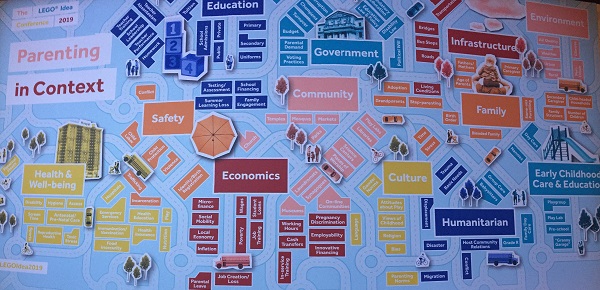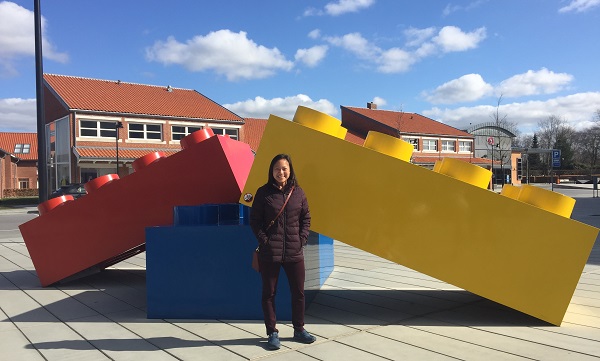
5 takeaways from the LEGO Ideas Conference: Unlocking the Power of Parenting
Photo: Yu-Ling Behr at the LEGO House in Billund, Denmark.
The LEGO Foundation brought together 300-plus thought leaders from all over the world to Billund, Denmark, the home of LEGO, for the annual LEGO Ideas Conference. From April 1-3, the conference focused on supporting the natural potential and influence of caregivers with the theme of “Unlocking the Power of Parenting.” I was humbled to be invited to this year’s conference given my work with Remake Learning Days Across America, Kidsburgh and Trying Together.
We all know that parents have a tough but important job. Parents and primary caregivers have a huge impact on their children’s development and learning. As the CEO of LEGO Foundation John Goodwin says, “A child’s favorite playmate is their parent.” But we can all also acknowledge that there is inherent stress in parenting. Through robust discussions, interactive talks and, of course, tons of play, I learned. I was inspired by the work happening in all corners of the world, and I came home even more determined to continue supporting the incredible work happening here in Pittsburgh.
Most importantly, the experience gave me a chance to reflect quietly on my own parenting values and how I care for myself and grow as a parent. While there are so many things to share about the LEGO Ideas Conference, I can’t cover all of them in detail. The line-up of speakers was awe-inspiring. Watch their videos here.
In the meantime, here are a handful of my takeaways.
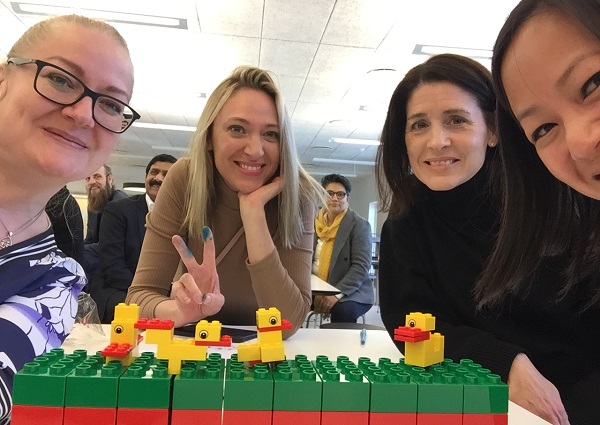
1. Learning through play
As you might expect, there was a lot of play at a conference hosted by LEGO. I was all too willing to join in on the fun. Held at the newly built LEGO House, there was no lack of inspiration, from the gorgeous 3-story tall tree to my personal favorite, a cascading waterfall.
LEGO firmly believes that when children play, they are tinkering, experimenting, figuring it out and having fun. In other words, they are learning. They’ve summarized the benefits “Learning Through Play” into five pillars:
- actively engaging,
- socially interactive,
- iterative (strengthening critical thinking),
- joyful (a great motivator),
- and meaningful.
This philosophy was applied to adults at the conference, too. We were tasked to build ducks from LEGOs. We soon saw how each person snapped together a unique duck. No two ducks were the same across the entire room! We each had to recall what a duck looked like and then build it until we felt we had just the right duck, an example of the iterative process.
The exercise was meaningful because it reminded us how much learning happens through play. For kids, this playful learning can lead to building such essential skills as critical thinking, problem-solving, collaboration, communication and innovation – in other words, skills necessary for creating brighter futures.
2. Parents need self-care, too
How many of us have had the day expressed by the complications of the above chart? This is everyday parenting. Yet, consider how toxic or stressful circumstances exacerbate what “everyday parenting” means. In a workshop by War Child, a nonprofit that works with families in conflict areas, I learned about their work with Syrian refugees in Lebanon.
A traumatic environment can cause untold stress on families. It disrupts a child’s growth and can take years to recover. As this nonprofit worked to help youth, they realized it was important to care for the parents, too. Those moms and dads have also gone through untold stress and trauma. If they don’t receive care, how can they be the parent they wish to be for their children?
Even in non-war scenarios, parents have stress in their lives. For parents to shape their children’s development positively, we need to implement self-care and look out for one another.
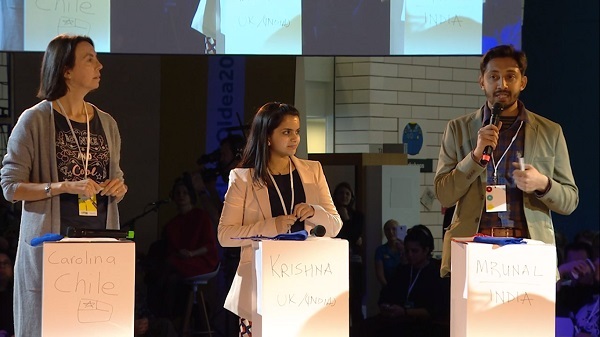
3. Context matters
In one of the hands-on workshops, we were challenged to consider context. Through a simple exercise, we were divided into small groups and given a scenario about a family. In my group, we were given a story about a middle-class family living in Mumbai, India.
As we asked questions and wrestled with what few clues we were given to understand the family better, we came to an important conclusion — context matters greatly. It’s not context at a broad level – such as race, geography, income or education — but at a very specific level of context to that family.
No two families are the same. No two people are the same. Just because two families may look alike and live next to one other, they are grappling with different parenting scenarios. So, it’s important to consider carefully what a family is going through. Context really matters. This has made me resolve to listen more and not to make assumptions.
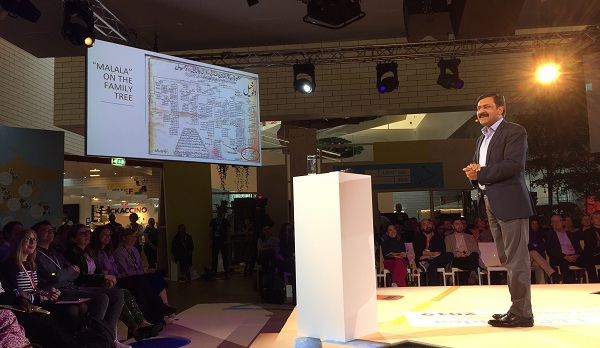
4. Rich in family values
One of the last keynote speakers was Ziauddin Yousafzai, a Pakistani education activist. He talked about his childhood and how he observed at a young age that girls and boys were treated differently. He experienced it in his own upbringing when given preferential treatment over his sisters. He spoke about his experience with education and how it opened doors for him. He lit up with love as he talked about his intelligent wife and how this led him down a path of creating an egalitarian household where the husband and wife had equal roles.
I loved how he proudly professed that whenever he was grappling with something, it was always his wife he would turn to for an opinion. When his daughter was born, he was determined for her to receive an education so she would have opportunities and choices, even though it was not common for girls to receive that level of schooling. He added his daughter to the family tree, which previously highlighted only men. And when his son was born, he made sure he understood that boys and girls are equal.
This man was not looking for fame. He was simply a good, hard-working, everyday father. They were a poor family, he said, but they were rich in values.
I want to thank Mr. Ziauddin Yousafzai for sharing his story. He was as inspiring as his daughter, Malala, with whom he co-founded the Malala Fund. It reminded me that values matter and we need to stand up to inequities that we see, especially the ones right in front of us.
5. Let’s change the way we talk about parenting.
Too often we talk about parenting from a place of “deficit.” Imagine where the conversation would go if we started from the positives and moved up. As one action team from the LEGO Ideas Conference said, “Let’s listen more. Let’s be positive about what works. Let’s help parents find a voice and let’s speak loudly as one. Let’s reframe the message as one about positive child development and not about bad parenting.”
We have a shared responsibility to care for our youth. Let’s work together to make this world a great place for all children.
I would like to thank Remake Learning Days Across America for their generous support in making it possible for me to attend the LEGO Ideas Conference. Please check out Remake Learning Days in Southwestern PA from May 9-19, 2019, for hundreds of free “learning through play” events for kids of all ages.
